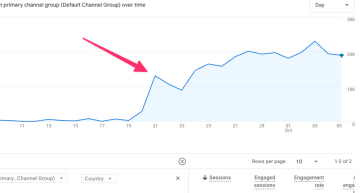Brandable or Keyword domains: Which drives the most SEO results?
Quick Summary of Contents
Let me start by making one thing clear: brandable or keyword .com domains can rank well in search engines.
There will always be pros and cons to using each type of .com domain name.
This week I received an email inquiring about whether or not it is “better” to build or develop a business website on a brandable domain or a keyword .com domain.
 How the question was worded was more a focus on search engine optimization (SEO) than an overall focus on how their domain name should align with their business goal and objectives.
How the question was worded was more a focus on search engine optimization (SEO) than an overall focus on how their domain name should align with their business goal and objectives.
I could sense there was a strong desire to make money taking the “by any means necessary” approach.
There was more weight given to SEO to the point that they were ready to make a heavy investment to create thousands of optimized keyword domain websites around a certain niche.
What they were really asking me was, “Which, brandable domain or multiple keyword domains, can bring me the most traffic and, most importantly, money with the least amount of time, money, and effort invested?”
This type of attitude or approach towards online business, whether unknowingly or knowingly, always ends up with a person holding a bag of shattered hopes and dreams.
And this is not just any bag, it’s a deceptive bag of long-term consequences for shortsighted decision-making.
The bag is not full of money as they had hoped and dreamed.
If the bag is full of money, it’s about how to spend that and even more money to fix a bad decision based on taking SEO shortcuts to achieve instant traffic and revenue.
In my humble opinion, it is imperative to not be led down the path of only focusing on short-term results at the expense of losing all long-term results.
Focusing on SEO instead of a sound business model.
The sad reality of this post is that I have fielded numerous calls from both camps in dire need of reversing their shortsighted decision to focus on SEO at all costs instead of a sound business model.
Any business model that greatly or solely depends on SEO from the start is doomed for failure.
And what little success one does obtain, consider it lightning in a bottle.
As I stated in the beginning, one will always have to consider the pros and cons when using each type of .com domain name to build their business on.
But first thing is first before you consider launching an online business, selecting a domain name, and looking to perform any type of SEO, be sure you have a sound business model that does not include a great dependence on SEO or a domain name.
Once you have a sound business model, your business model will help navigate the pros and cons of choosing a brandable domain, a keyword domain, or multiple keyword domains.
Pros and Cons of Brandable Domains.
When selecting to build or develop your business using a brandable domain, there are many things to consider.
Most people tend to name their company first and find the domain second although there are a few that determine their business name based on the availability of a domain.
Once they find an available domain, then they are off to races building, marketing, and branding their website to the masses.
Most will spend quite a large sum of money on advertising and marketing to make a name and brand for their business in efforts of generating customers and revenue.
 However, the unfortunate thing about branding is that brands are what people tend to search for only after they get to know your brand.
However, the unfortunate thing about branding is that brands are what people tend to search for only after they get to know your brand.
For instance, if no one knows that your business is BobsBags.com, then how do they know the following:
- Where to look for you and your business?
- More importantly, how do they know what Bob is selling?
- What type of bags is Bob selling?
It’s easy to assume that Bob is selling bags. However, Bob could be selling handbags, travel bags, shopping bags, grocery bags, canvas bags, plastic bags, and so on.
One might say that BobsBags.com would have a better opportunity to sell shopping bags using a keyword domain like ShoppingBags.com.
His company could keep and brand the name Bob’s Bags, but branding and developing Bob’s Bags on a keyword domain like ShoppingBags.com will naturally open the door to greater online market share and SEO favor.
Using ShoppingBags.com allows for the website to favorably rank because potential customers search using those exact keywords, “Shopping Bags”.
There are a variety of head and long tail keywords that ShoppingBags.com can rank for naturally unlike BobsBags.com.
You’ll have to commit more SEO effort to optimize BobBags.com than ShoppingBags.com.
However, the downside to branding Bob’s Bags on ShoppingBags.com is that the domain is limited to only shopping bags.
What if Bob wanted to sell more than shopping bags at some point in the future?
Whereas BobsBags.com lends itself to many types of bags, ShoppingBags.com does not.
Using a brandable domain as your online presence lends itself to greater flexibility to grow your business in any direction. But brandable domain names don’t naturally lend themselves to favorable SEO ranking.
Regardless, you’ll need more than a little elbow grease to optimize your website using a brandable domain.
However, the same can be said for keywords which we’ll discuss next the pros and cons of keyword domains next.
Pros and Cons of Keyword Domains.
Building and developing your website using a keyword domain or multiple keyword domains is a favorable option to get a head start on receiving a boost in SEO and ranking high in a faster period of time.
 If you choose not to build your business on a keyword domain, you can simply purchase keyword domains, whether hand-registered or expired domain names and forward keyword domains to your website.
If you choose not to build your business on a keyword domain, you can simply purchase keyword domains, whether hand-registered or expired domain names and forward keyword domains to your website.
Typically the best option for building your business on a keyword domain is using an industry-defining or category-killer domain.
Industry-defining domains tend to be one and maybe two words in most that make up the domain.
Great industry-defining domain examples are Loans.com, Plumbing.com, and Candy.com.
These category-killer domains are quite easy to remember and generic in nature because they are typically the words that come to mind for a specific industry or when searching for a service or product you are in need of.
More notably, a hidden benefit of keyword domains is that they sometimes offer an opportunity to bypass search engines and receive type-in traffic.
This happens when potential customers type category-defining words into a web browser and append .com to the end of their search keyword or keyword phrases.
Keyword domains tend to lower your marketing and advertising spend on SEO because they naturally lend themselves to high visibility in search rankings and results.
Other examples of keyword domains are exact-match domains and geo domains.
Exact=match domains are comprised of two or more words that match the phrase that potential customers use when searching.
Geo domains typically consist of a city name alone (e.g. Atlanta.com) whereas geo keyword domains typically consist of a set of keywords that have a city name prepended or appended to the keywords.
Great examples of exact-match domains are CordlessBeardTrimmers.com, CheapLand.com, and OfficeSupplies.com.
Great examples of geo and geo keyword domains are PalmSprings.com, AustinHomes.com, and RoundRockACRepair.com.
Exact-match domains, geo domains, and geo keyword domains are excellent ways to build local, regional, and national awareness for a business.
However, one downside for geo and geo keyword domains is that they tend to lock you into a finite location for a specific service and product.
This could also be said for exact-match domains although they tend to not lock you into a location generally speaking.
Another downside to geo and geo keyword domains is that they can be quite expensive as your cost can double depending on the number of domains you need to register.
If you a local or regional business, the cost tends to remain inexpensive.
However, if you are a national or global business, annual domain renewal costs can skyrocket into the tens and hundreds of thousands of dollars.
For example, you may want to own the keyword+geo in addition to owning the geo+keyword domain.
This keeps prepended and appended geo domains from falling into the hands of your competition.
Another disadvantage is that exact-match domains can be quite long to type in, seeing most are 2-4 words long.
In addition, exact-match domains have been somewhat handicapped in terms of their SEO boost with Google releasing an update.
I will say that the exact-match domain update doesn’t necessarily rain on your SEO parade in terms of ranking.
However, it all depends on how you use the exact-match domain.
If you are out to solely game search engines, then you’ll never rank or your search rankings will be short-lived.
And finally, unlike brandable domains, it can be quite a challenge to brand keyword domains if they do not match the company name.
In the end, you’ll have to decide whether using keyword domains that easily generate traffic via type-in, high search rankings, and search traffic outweighs not being able to brand or grow your business as easily as using a brandable domain.
Those are critical points of great importance to consider in the long term.
For example, if your company name is Austin Commercial Roofing and you use AustinCommercialRoofing.com as your domain name for your business website, then you’re ok.
But if your company name is Ted’s Roofing Company and you using AustinCommercialRoofing.com and offer more than commercial roofing, then using a keyword domain may not be in your best interest.
Carefully consider all arguments when deciding to use brandable or keyword domains
In closing, I think it is imperative to figure out your business model and what your business model lends it to in terms of location, and future growth.
If your business model is poised to go beyond local, then using geo keyword domains may not be the best fit for your business.
You may very well have to choose an exact-match domain specific to your industry or even better if you’re going global, a brandable domain.
And if you don’t vision your business model going national or global, then it may be in your best interest to use keyword domains, exact-match, geo, and geo keyword domains, over brandable domains.
I will state say that it is quite easier to lessen your cost using keyword domains over brandable domains although I could argue both sides.
Simply put, figuring out which one to use comes down to understanding your business model and where you envision taking your business.
Both brandable and keyword domains attain very attractive advantages and limiting disadvantages.
Both are able to help you in their own way to increase awareness, generate traffic and revenue, and as well as keep your cost at bay.
The difference between the two types of domains will be initial and lifetime investment, and the time, short or long term, it takes to generate search rankings, traffic, customers, and revenue.
So choose wisely, but don’t simply choose with search engines only in mind.
Keep that business model first, aligning your domain and diversifying traffic sources.














